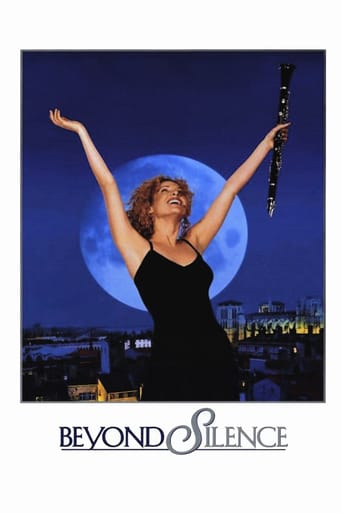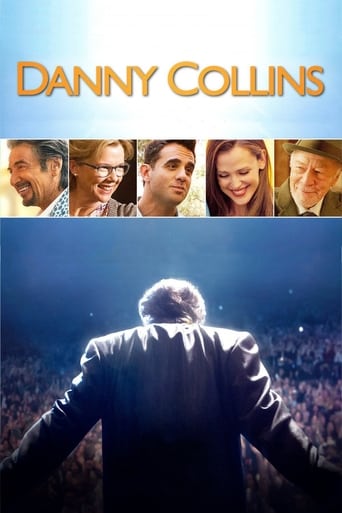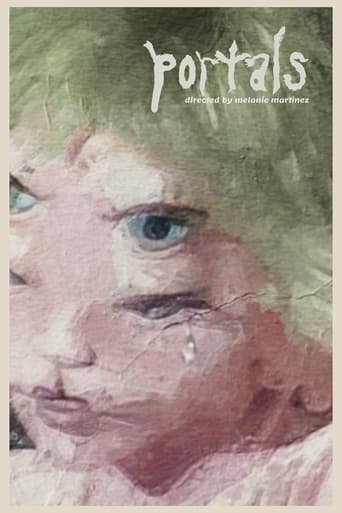

Beyond Silence (1996)
Beyond Silence is about a family and a young girl’s coming of age story. This German film looks into the lives of the deaf and at a story about the love for music. A girl who has always had to translate speech into sign language for her deaf parents yet when her love for playing music grows strong she must decide to continue doing something she cannot share with her parents.
Watch Trailer
Cast
Similar titles


Reviews
I love this movie so much
That was an excellent one.
Powerful
The acting is good, and the firecracker script has some excellent ideas.
Jenseits der Stille (Beyond Silence) is an excellent film. I wish I had seen (or heard about) this film years ago! I am a big fan of German cinema and have worked closely with the Deaf community in Canada. The performances were outstanding and the story realistic. I hope to see more works by these actors, the writer and director.Chad
I think this is a GREAT film, and a wonderful piece of artwork. A very touching story between Lara and her parents. By the end I was weeping I was so touched ( and I don't cry easily at movies ). The Deaf culture is one very few of us take time to understand, but I think through films we can at least try. I HIGHLY recommend this film to anyone who is interested in Deaf culture, or just a great foreign film.
Jenseits de Stille can be understood to belong to the genre of films known as social milieu films, or, in Germany, 'problem films'. These films function as explorations of certain specific cultures or classes and the intricacies and contradictions therein. For example, a social milieu film might examine working class life as such, and in tandem with other films of the sort, could create an overall filmic representation of the strife of working class existence. In the case of Jenseits der Stille, the milieu that is examined is the Deaf world, specifically in Germany. By following the coming of age of Lara, a hearing child of Deaf parents, we are led through one woman's experiences with and in the Deaf world. That the film is also a touching story of family relations and can be seen as a drama, a family movie, etc. does not exclude it from also functioning in this realm of 'problem film.' Rather, it can be seen to convey information and insight into a broader concept or community through the experiences and insights of one individual. Lara is constructed as a conflicted character even before she receives the fateful clarinet. As the hearing daughter of Deaf parents, she is often placed in interpreting situations, and expected to relay messages that surpass her scope as child. Instances such as her father's colleague's implication that she tell him of the non-existent Christmas bonus or her role as interpreter at the bank quickly convey the ways in which she is forced to grow old before her time. She must live in an adult's world and negotiate that world despite her age. Her parents are characterized as somewhat aloof of the demands that they make on her, and her own isolation is foregrounded. It is only when her aunt fosters her musical interest that Lara begins to find a sense of herself. These feelings of isolation, difficult communication and difference are expressed mainly through Lara, although her parents and extended family exhibit them as well. This film presents a great deal of verifiable information about the Deaf community through Lara and her family. Many Deaf couples give birth to hearing children, and conversely, the majority of Deaf people are born to hearing parents. The Christmas dinner and Martin's painful memories emphasize this occurrence. In this way, without the film being didactic or expository in its conveyance of Deafness, hearing viewers are still educated as viewers about the very real situations that many Deaf families must negotiate. Obviously the lexical difference of spoken and signed languages plays a large role in the film as well. This difference becomes important within the film as hearing viewers are attuned to different ways of seeing. Within the medium of film this is often the goal of filmmakers, to create new ways of viewing, of reading images. When this already visual medium is then used to explore yet another visual medium, the Deaf world, many doors are opened. An example of this is the intimacy between Kai and Martin, evident when they lie in bed together and Martin uses Kai's chest for his signing. A similar scene occurs in Children of a Lesser God as well, and both work to convey the shared space. A different level of intimacy is expressed, because the viewer then considers the act of communication through the body rather than just the mouth. Once this is understood, all movement on the screen has the potential to create atmosphere and convey information that far surpasses what a hearing viewer might normally require of a film. Ultimately this film engages with the social milieu of Deaf communities through both presentation and representation. That is, Deafness is represented and explored diegetically, while the medium of the film itself also serves to further explore that realm. Thus, Jenseits der Stille also functions to instrumentalize Deafness for the means of understanding image. This is perhaps a pairing of subject and medium that simply cannot be overlooked.
As the child of a single parent who is deaf, Beyond Silence is, in most aspects, a very true portrait of how I grew up. Scenes such as going to the bank and talking to the teacher were my actual experiences and difficulties I have faced all the time. It was just so real I couldn't help getting emotional as the story went on. For those who live or work with deaf or hard-of-hearing people, this is a must see; for those who don't, you should definitely see it as well and cherish your good sense of hearing -- being able to communicate easily is not a gift for everyone as most people take for granted.







